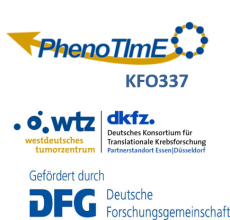PhenoTImE: PhD Project #3
Description Project #3 Targeting clonally expanding drug-resistant tumor cells in recurrent glioblastoma
Based on recently developed methods for predictive modeling of intra-tumor subclone dynamics, we have identified in clinical samples a potentially relapse-driving subpopulation of brain tumor cells in glioblastoma. Through molecular and pharmacological investigation using tailored ex vivo and PDX models of disease as well as paired vital cell samples from naïve and post-therapeutic settings, we could demonstrate that these cells expand clonally under the influence of standard temozolomide (TMZ) chemotherapy. Further in situ validation in paired sample cohorts confirmed that specifically these cells develop resistance to TMZ-exposure via selective co-expression and hyperactivation of the AKT pathway at disease relapse. This is important, because TMZ-based treatment schemes represent the ‘gold’ standard in current glioblastoma care and because every patient on these schedules develops a relapse (even those that initially respond to treatment) usually within 6-9 months of primary therapy, i.e. during TMZ exposure. In the proposed work, we will scrutinize the clinically relevant, yet previously unconsidered subclonal evolution of target cell populations. Underlying candidate mechanisms of mutational and/or phenotypic drug resistance will be thoroughly explored in paired naïve vs. post-therapeutic human samples using targeted genome-, transcriptome- and methylome analysis, and by investigating epi-metabolic circuitries. Identified driver mechanisms, e.g., affecting the AKT-mTOR pathways, deletion of PTEN, or autophagy will be probed in selected gain- or loss-of function assays, while alternative (epigenetic) mechanisms and assays for therapy-induced E-M transitions and epigenetic modulators like the H3K4 demethylase JARID1B/KDM5B will be conducted in appropriate 2D/3D culture models. Lastly, cell state-specific drug regimens identified by our approach will be applied in orthotopic PDX approaches towards straightforward translational rationales for the design of early clinical trials and for the establishment of new biomarkers/companion diagnostics alongside.
Project-related publications of the Scheffler lab (selection)
Li Y, Li A, Glas M, Lal B, Ying M, Sang Y, Xia S, Trageser D, Guerrero-Cázares H, Eberhart CG, Quiñones-Hinojosa A, Scheffler B, Laterra J. c-MET signaling induces a reprogramming network and supports the glioblastoma-like phenotype. Proc Natl Acad Sci U S A. 2011 Jun 14;108(24):9951-6.
Wieland A, Trageser D, Gogolok S, Reinartz R, Höfer H, Keller M, Leinhaas A, Schelle R, Normann S, Klaas L, Waha A, Koch P, Fimmers R, Pietsch T, Yachnis AT, Pincus DW, Steindler DA, Brüstle O, Simon M, Glas M, Scheffler B. Anticancer effects of niclosamide in human glioblastoma. Clin Cancer Res. 2013 Aug 1;19(15):4124-36.
Till A, Saito R, Merkurjev D, Liu JJ, Syed GH, Kolnik M, Siddiqui A, Glas M, Scheffler B, Ideker T, Subramani S. Evolutionary trends and functional anatomy of the human expanded autophagy network. Autophagy. 2015;11(9):1652-67.
Reinartz R, Wang S, Kebir S, Silver DJ, Wieland A, Zheng T, Küpper M, Rauschenbach L, Fimmers R, Shepherd TM, Trageser D, Till A, Schäfer N, Glas M, Hillmer AM, Cichon S, Smith AA, Pietsch T, Liu Y, Reynolds BA, Yachnis A, Pincus DW, Simon M, Brüstle O, Steindler DA, Scheffler B. Functional subclone profiling for prediction of treatment-induced intratumor population shifts and discovery of rational drug combinations in human glioblastoma. Clin Cancer Res. 2017 Jan 15;23(2):562-574.
Candidate Qualifications and Assignments
-
Candidate’s profile:
- Master’s degree in any of the following or equivalent disciplines: Medical Sciences, Biology, Molecular Biology, Immunology, Cell Biology
- Practical expertise in cellular and molecular biology standard methods (e.g. QPCR, WB, immunocytochemistry, flow cytometry)
- Expertise in cultivation of human cells
- Experience in animal work would be an advantage
- Excellent communication and written skills in English
- Experience in drafting oral presentations
- Excellent organizational skills and attention to detail
- Particular interest in brain tumor research and translational bench-to-bedside concepts
- Highly motivated, creative, committed and able to work independently and in a team
Project tasks & training:
- Cell culture and functional assays for phenotypic cell characterization and fingerprinting (proliferation, growth, invasion, cytotoxicity)
- Characterization of drug effects and drug resistance phenomena in heterogeneous glioblastoma cell populations
- Genetic profiling of cells
- Multiplexed staining of human glioblastoma cells and tissue samples
- Implementation of various molecular biological tools such as doxycycline-inducible vectors systems, reporter constructs, etc.
- Testing of novel drug sequencing approaches in vivo (PDX disease models)
- Validation of research findings in situ (human tissue samples)
- Experimental planning, implementation, and subsequent evaluation
- Presenting of work at national and international conferences and writing of scientific manuscripts
- Active collaboration with other researchers within the Clinical Research Unit


